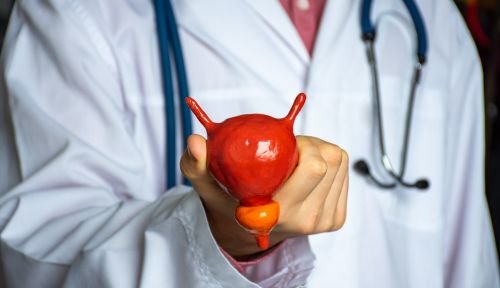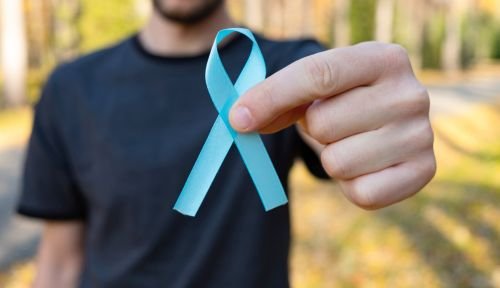Most men who feel changes in the prostate or who visit for a preventive check-up ask a urologist: how to live and what to take to avoid problems with male internal sex glands. Prostate symptoms should be monitored. Prostate disorders can greatly affect your lifestyle, sexual relations and perception of how to live. Even the slightest prostate symptom can cause stress and make you think about further solutions to this problem.

Prostate: what is it?
The prostate is a tiny, chestnut-sized, internal (invisible) male gonad located in front of the rectum, where the ureter exits, below the bladder. It secretes a substance that thins spermatozoa and creates a favorable environment for their propagation. There is a certain barrier that protects the man's testicles, bladder, and kidneys from an infectious infection.
There are three main prostate diseases: prostatitis, benign prostatic hyperplasia and prostate cancer. These three prostate diseases are related to each other. Persistent prostatitis increases the chance of developing prostate cancer or benign prostatic hyperplasia later in life. The most common prostate disease in young people is chronic prostatitis.

Causes of prostate
Prostatitis can occur for many reasons. However, these are the main and most common reasons:
- Stress
- Smoking
- Alcohol
- Water content
- Nutrition Irregular sex life
- Night work
- Lack of physical activity
Inflammation of the prostate in men
It is a swelling and inflammation of the prostate gland, located just below the bladder. According to the World Health Organization, approximately 1 in 10% of all men worldwide have prostatitis, making it one of the most painful but also the most common diseases in men. The situation is further aggravated by the fact that prostatitis is very difficult to treat, and without treatment, oncological disease can develop.
Prostatitis – inflammation of the gland
As the condition worsens, abscesses may appear, which develop into inflammatory foci, and in rare cases, stones may form. It is a mistake to think that this condition simply affects physical health; mental and emotional health can also be compromised. As a result, relationships with the second half, family stability and work capacity may suffer. The good news is that prostatitis can be easily treated if caught early.
Disease classifications of acute or genital prostatitis
Acute prostatitis
Acute prostatitis can be caused by germs transmitted during sexual intercourse. However, it is usually caused by a bladder or urethral infection. Risk factors include genital injuries, urinary tract surgeries and a weakened immune system.
Chronic prostatitis
The acute form of this disease can develop this way or occur as a result of a previous infection. Therefore, it is very important to effectively and quickly treat inflammation of the urethra in order to avoid complications and chronic diseases.

Prostate Symptoms
- Perineal pain;
- testicular pain;
- Pain or discomfort during ejaculation;
- Premature ejaculation;
- Blood in semen.
For the treatment of these diseases, it is recommended to refer patients to a urologist. Similar symptoms are more often caused by benign prostatic hyperplasia in older people, and signs of chronic prostatitis in younger people.
Reasons
Acute prostatitis
Various factors such as injuries to the genitals, weakened immunity, infections or germs introduced during intercourse can cause this type of prostatitis.
In addition to frequent urination, this condition often causes pelvic discomfort, fever and chills. It is also necessary to emphasize the fact that this type of prostatitis usually begins suddenly and unexpectedly.
Chronic prostatitis
Chronic prostatitis can be an acute consequence of this disease, which can also be caused by a weakened immune system. These additional variables may also play a role in chronic prostatitis, despite the above being the most common causes: sex life; genital infections; improper forced position; the vibration is transmitted to the pelvic area. It is also important to emphasize that this form of prostatitis is divided into:
- chronic bacterial prostatitis - caused by Escherichia coli, Enterobacter, Pseudomonas, Neisseria gonorrhoeae, fungi, etc.
- chronic non-bacterial prostatitis.
Asymptomatic inflammatory prostatitis
When there are signs of infection or inflammation, but the patient does not have obvious symptoms, such as discomfort, this type of prostatitis is determined.

Is it curable?
Prostatitis is a curable disease. But don't wait, contact your urologist as soon as you notice any of the above symptoms. The most important thing to remember is that it will be easier to heal if you delay less and visit the doctor sooner. Depending on the disease, different treatments can be performed:
- Antibiotics (usually lasts 4 to 12 weeks)
- Proteolytic enzymes
- If the patient complains of sexual problems, psychotherapy can become an integral part of the treatment
- During the treatment period, it is important to follow a normal sleep, nutrition and rest regime; a hot water bath is recommended
It is very important to emphasize that there are many different ways to treat this disease, including more than 100 different types of drugs and several dozen different methods.
Benign enlargement of the prostate
Benign prostatic hyperplasia - an enlarged prostate gland
This gland, commonly known as benign prostatic hyperplasia, is a common problem in older men. Unpleasant urination symptoms, such as blockage of urine flow from the bladder, can be caused by an enlarged prostate gland. It can also cause kidney, urinary tract or bladder problems.
Benign prostate symptoms
People with an enlarged prostate can experience symptoms of varying intensity, but symptoms often worsen over time. Common symptoms include:
- Frequent or urgent need to urinate;
- Increased frequency of urination at night (nocturia);
- Difficulty starting to urinate;
- Inability to completely empty the bladder.
Causes of benign prostate
Possible reasons:
- Urinary tract infection;
- Inflammation of the prostate;
- Narrowing of the urethra;
- Bladder or kidney stones.
Below the bladder is where the prostate gland is located. The core of the prostate contains a tube that transports urine from the bladder to the penis. When the prostate is enlarged, the outflow of urine is impaired. Most men have an enlarged prostate for the rest of their lives. This continuous development causes the prostate to enlarge to the point where it causes problems with the urinary tract or obstructs the flow of urine. However, this may be due to changes in the balance of sex hormones as men age.
Can drugs cure benign prostate enlargement?
Medicines help treat mild to moderate symptoms of an enlarged prostate.
Possible variants of drugs:
- Alpha blockers. These drugs relax the prostate and bladder muscles, which makes urination easier. In men with relatively small prostates, alpha-blockers such as alfuzosin, doxazosin, tamsulosin, and silodosin usually start working immediately.
- 5-alpha reductase inhibitors. By stopping the hormonal changes that cause the prostate to enlarge, these drugs reduce the size of the prostate. Medicines such as finasteride and dutasteride only work for a maximum of six months.
- Combined drug therapy. Your doctor may recommend taking an alpha blocker and a 5-alpha reductase inhibitor at the same time if one of the drugs is not effective.
- Tadalafil. Often used to treat erectile dysfunction, it can also treat prostate enlargement.
Transurethral resection of the prostate
Excess prostate tissue – all but the outer one – is removed by a doctor by inserting a device into the urethra. TURP helps relieve symptoms quickly, and many men experience stronger urine immediately after surgery. A catheter may be needed temporarily to empty the bladder after TURP.
Transurethral incision of the prostate
To facilitate the flow of urine through the urethra, the surgeon makes one or two small incisions in the prostate gland to allow urine to flow more easily through the urethra. If you have a small to moderately enlarged prostate, this procedure may be possible, especially if you have health problems that make other treatments too dangerous.
Laser therapy
Overgrown prostate tissue is destroyed with a laser. In contrast to outpatient surgery, laser treatment often provides rapid symptom relief and has a lower risk of adverse effects. Men who should not have other prostate surgery because of blood thinners can have laser therapy.
Open or robot-assisted prostatectomy
To access the prostate and remove the tissue, the surgeon makes an incision in the lower abdomen. If you have a very large prostate, bladder damage, or other problems, an open prostatectomy is usually performed. The surgery carries a higher risk of blood transfusion and may require a short hospital stay.

Prostate cancer – an insidious disease
An enlarged prostate can narrow the urethra and prevent regular urination. Men over the age of 45 usually suffer from this disease. If the patient's father or siblings had it or died from cancer, there is a slightly higher chance of getting the disease. External factors such as diet or lifestyle are believed to have a greater influence on the development of cancer.
What is prostate cancer?
When the altered prostate cells begin to divide uncontrollably and form a mass called a tumor, prostate cancer begins to spread. It can be benign or malignant.
Types of prostate cancer:
Types of cancer, determined by the cells and tissues from which the primary prostate tumor developed:
- Small cell carcinomas;
- Neuroendocrine tumors;
- Transitional cell carcinomas;
- Sarcomas.
Such diseases are uncommon. Adenocarcinoma of the prostate is present in almost all men with prostate cancer.
Symptoms of prostate cancer
The first signs of prostate cancer:
- Decrease in potency
- Frequent urination
- Unpleasant pains in the groin or lower back
- Weight loss
- A feeling that the bladder has not completely emptied
- Swelling in the pelvis or legs
- Weakness or numbness in the legs or feet
- Fatigue
That said, while these symptoms can be alarming, they don't always mean you have prostate cancer.
Causes of prostate cancer
This disease may not cause any signs or symptoms in its early stages. When the cancer is more advanced, it can be caused by benign prostatic hyperplasia, which is not related to cancer. Many men have an enlarged prostate as they age. Cancer is more likely to occur with older age, race, family history, smoking, and obesity.
How often should men have their prostate checked?
The recommended interval between visits to a urologist depends on the prostate changes detected, so the next visit may be offered after 1 to 8 years.
It is most often diagnosed in men over 50 years of age. When cancer can still be effectively treated, this oncological disease does not cause any symptoms, so it is advisable for men aged 40 and men aged 45-50 to have regular prophylactic prostate examinations so that prostate tumors can be detected as early as possible.
When to start screening depends on your existing risk factors.
How to cure prostate cancer?
It is the most common prostate disease in men, for which there are several scientifically proven prostate treatments:
- Surgical treatment;
- Radiation therapy treatment;
- Hormone therapy treatment.
These treatment methods must be prescribed by a doctor.
It should be recognized that the prostate is a deadly disease, one of the main risks of which is the transformation into a prostate cancerous tumor. And in the end, the patient usually dies because of it. Uncontrolled and untreated disease can sometimes progress extremely quickly; already after 1-2 years, the prostate may have turned into a cancerous tumor.
But now men have a unique opportunity to permanently cure this disease, and without a visit to the clinic.
in 2023 a revolutionary drug has appeared that completely cures even chronic prostatitis and quickly restores the function of the prostate gland. In addition, it greatly increases the potency and duration of intercourse. The name of this medicine is Uromexil Forte. Despite the fact that medical scientists from Germany and France contributed to its creation, it is a very inexpensive Lithuanian medicine.
According to calculations, the effectiveness of this drug was 96.9%.
Therefore, several lifestyle changes and medication use can help prevent prostate disease. Although many men fear this disease, it is often effectively managed. The most important thing is not to be ashamed to seek help.
How find out which vitamins, minerals or other supplements the most appropriate at the moment? Try it free test "Your Day" ! where you will find out needs of the body and you will get personal recommendation!











